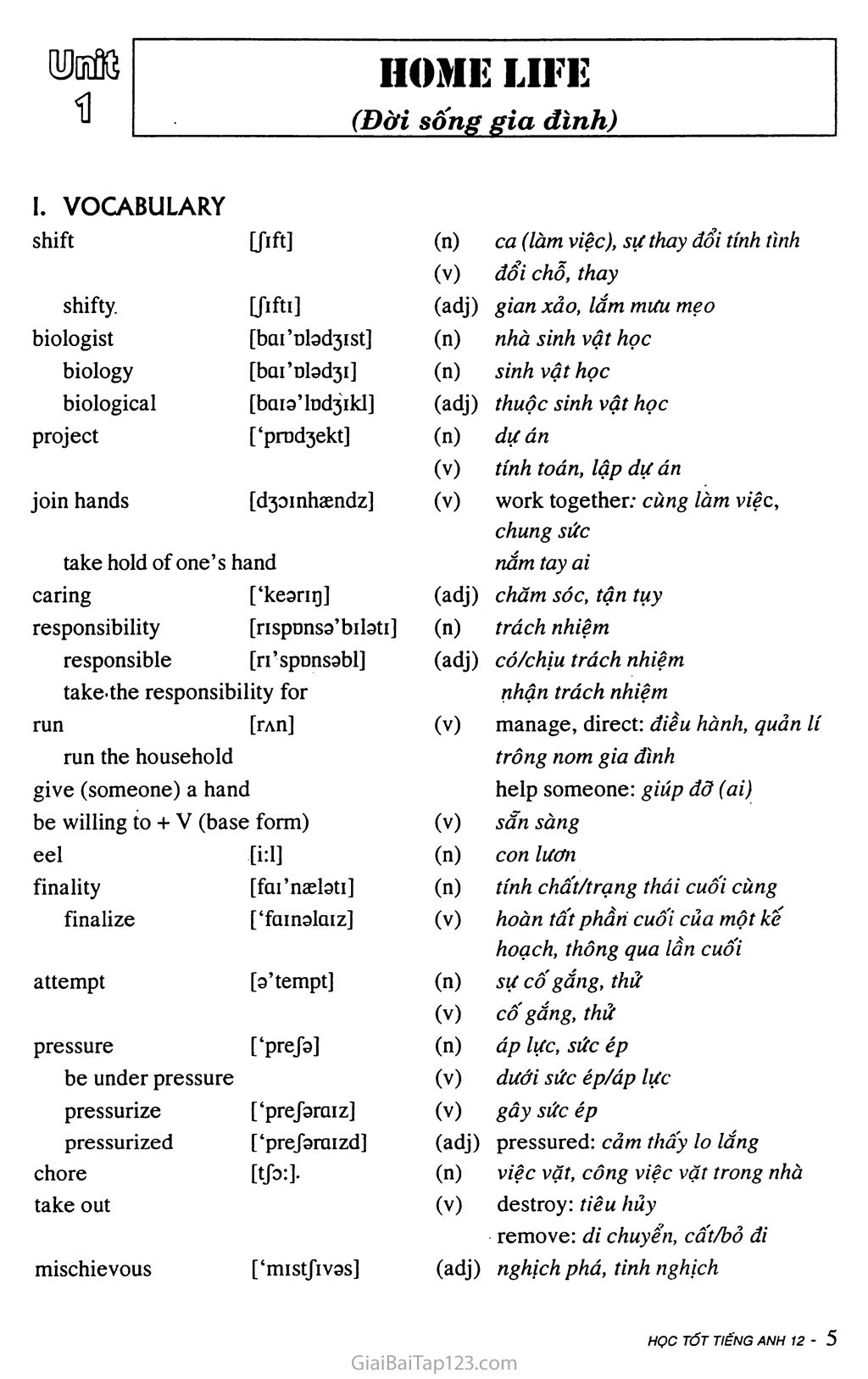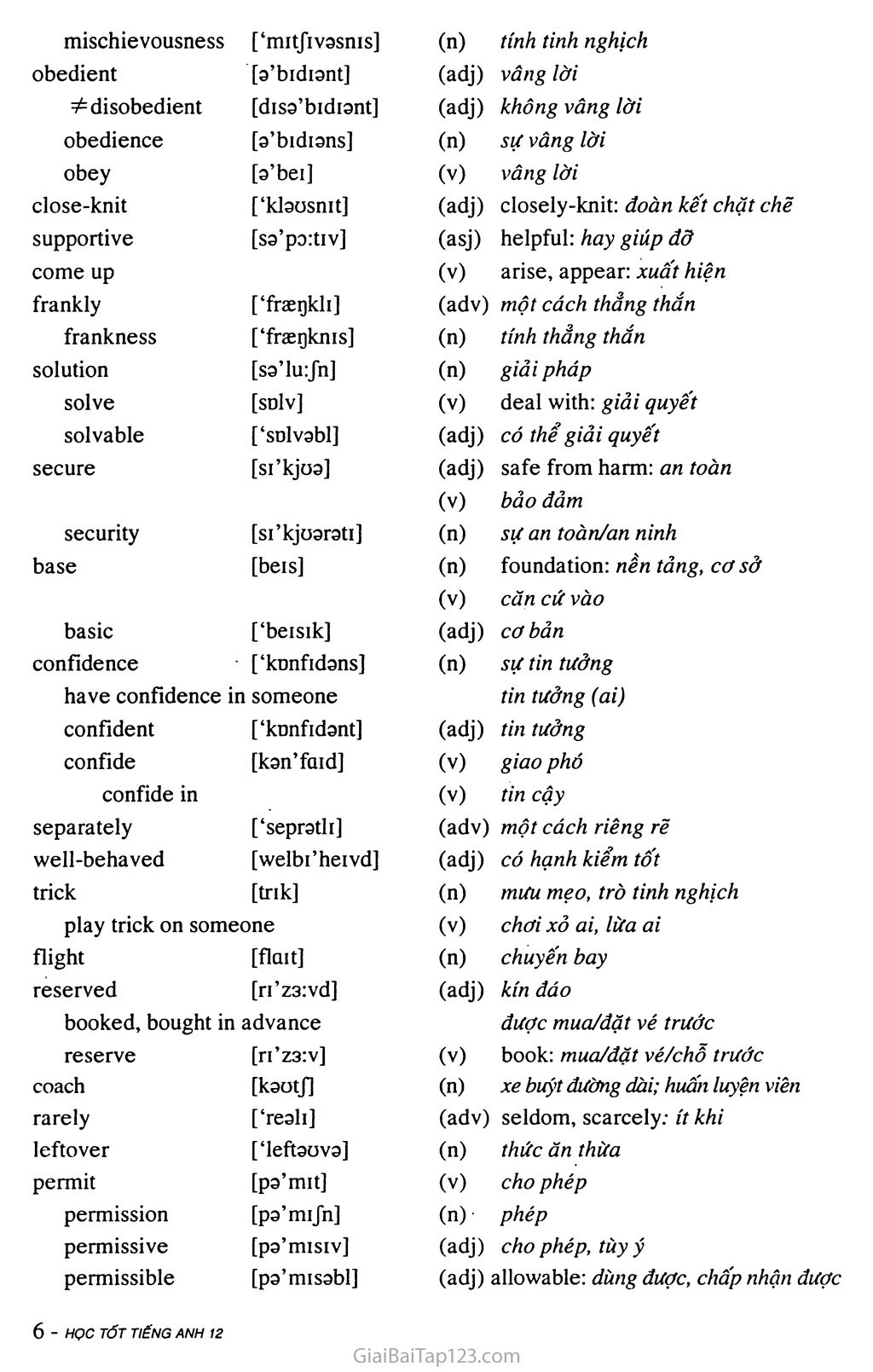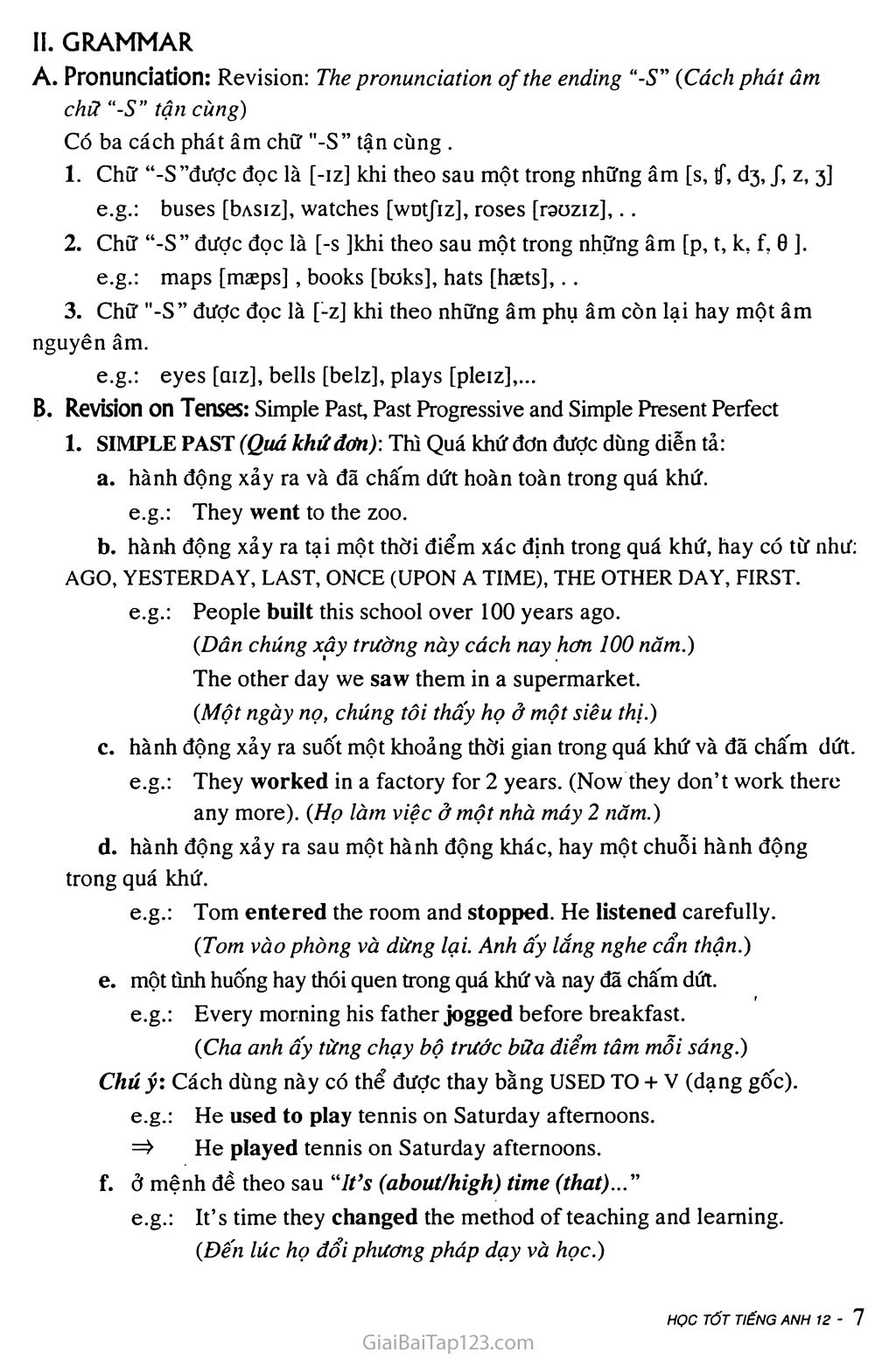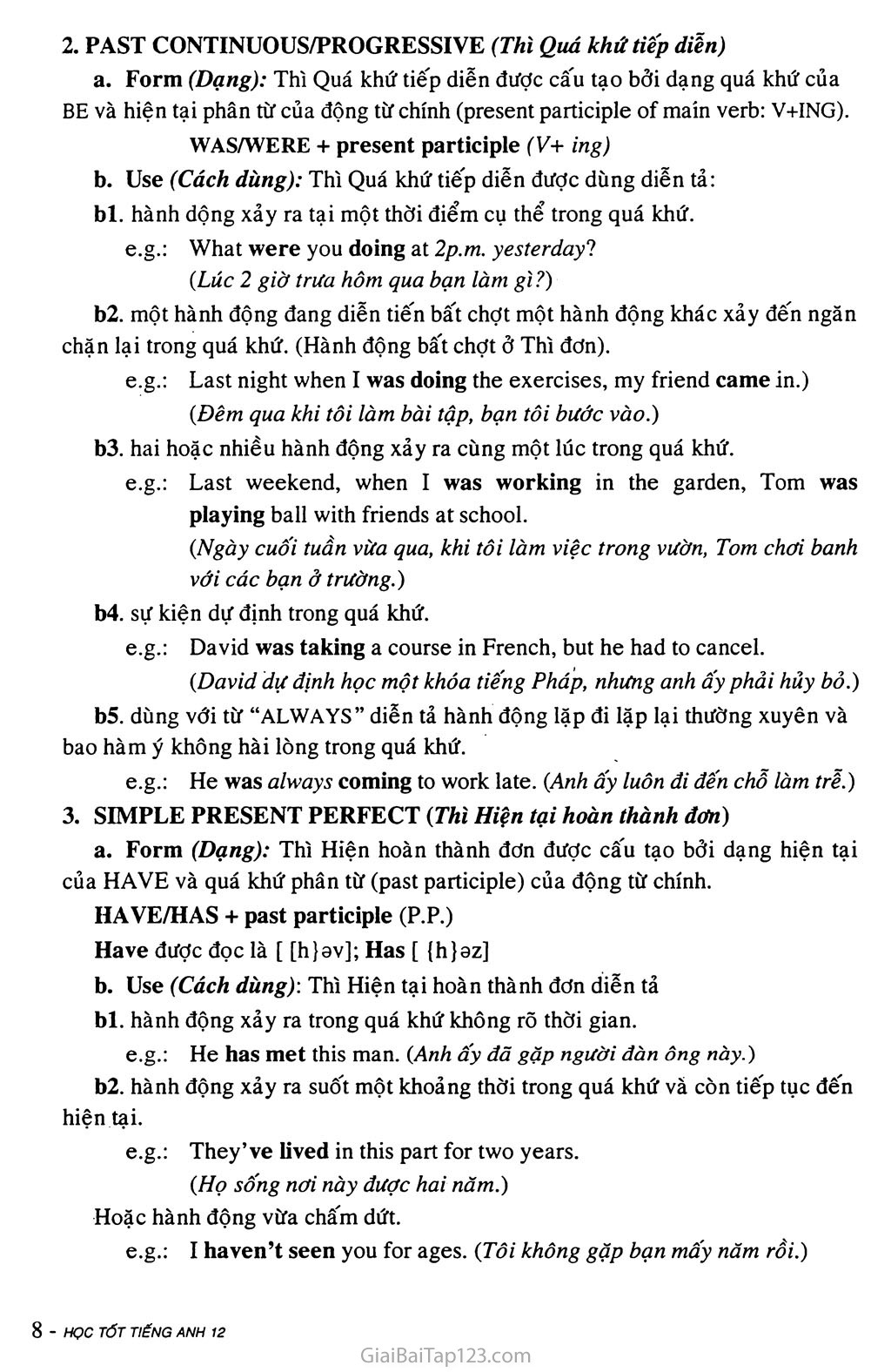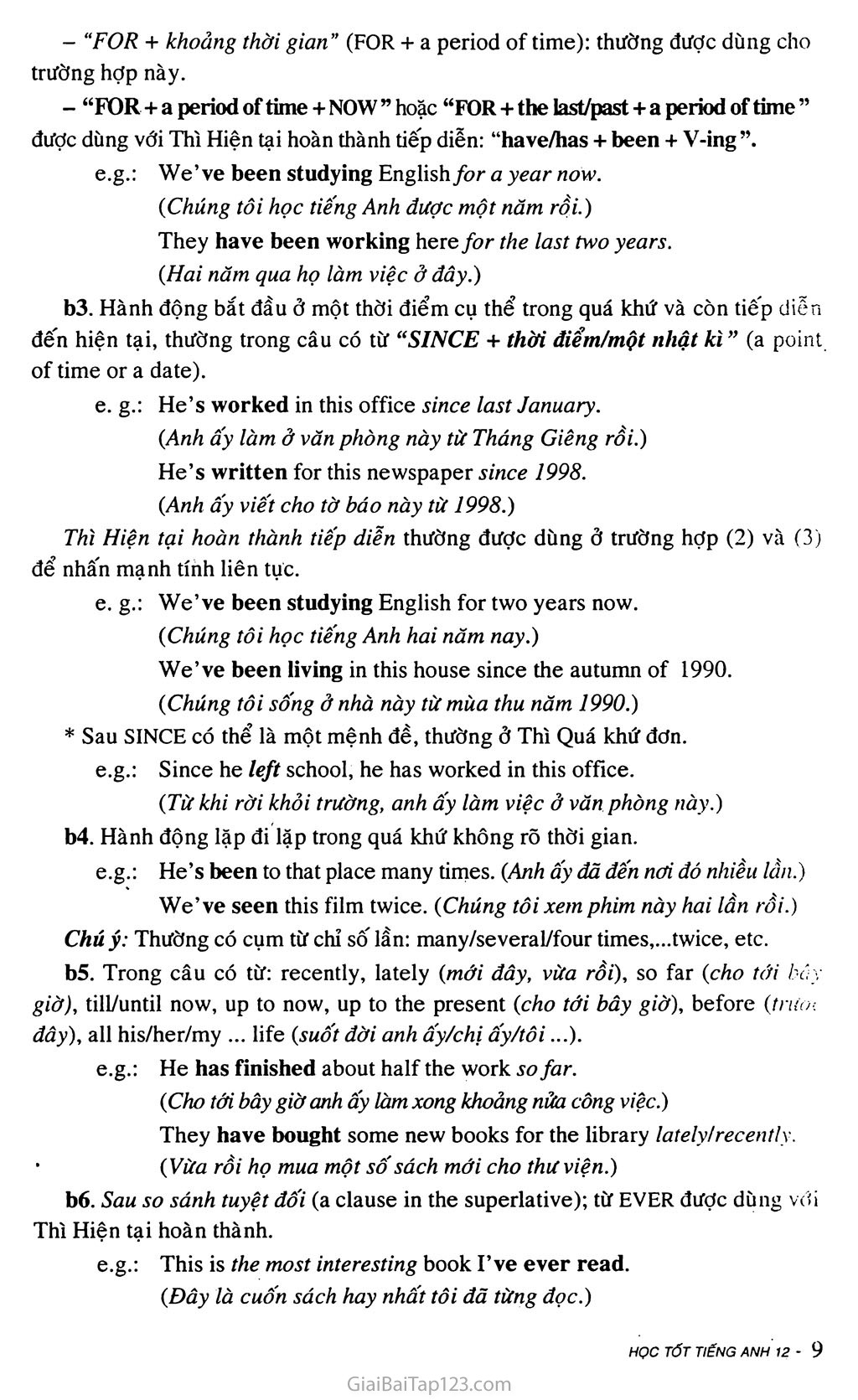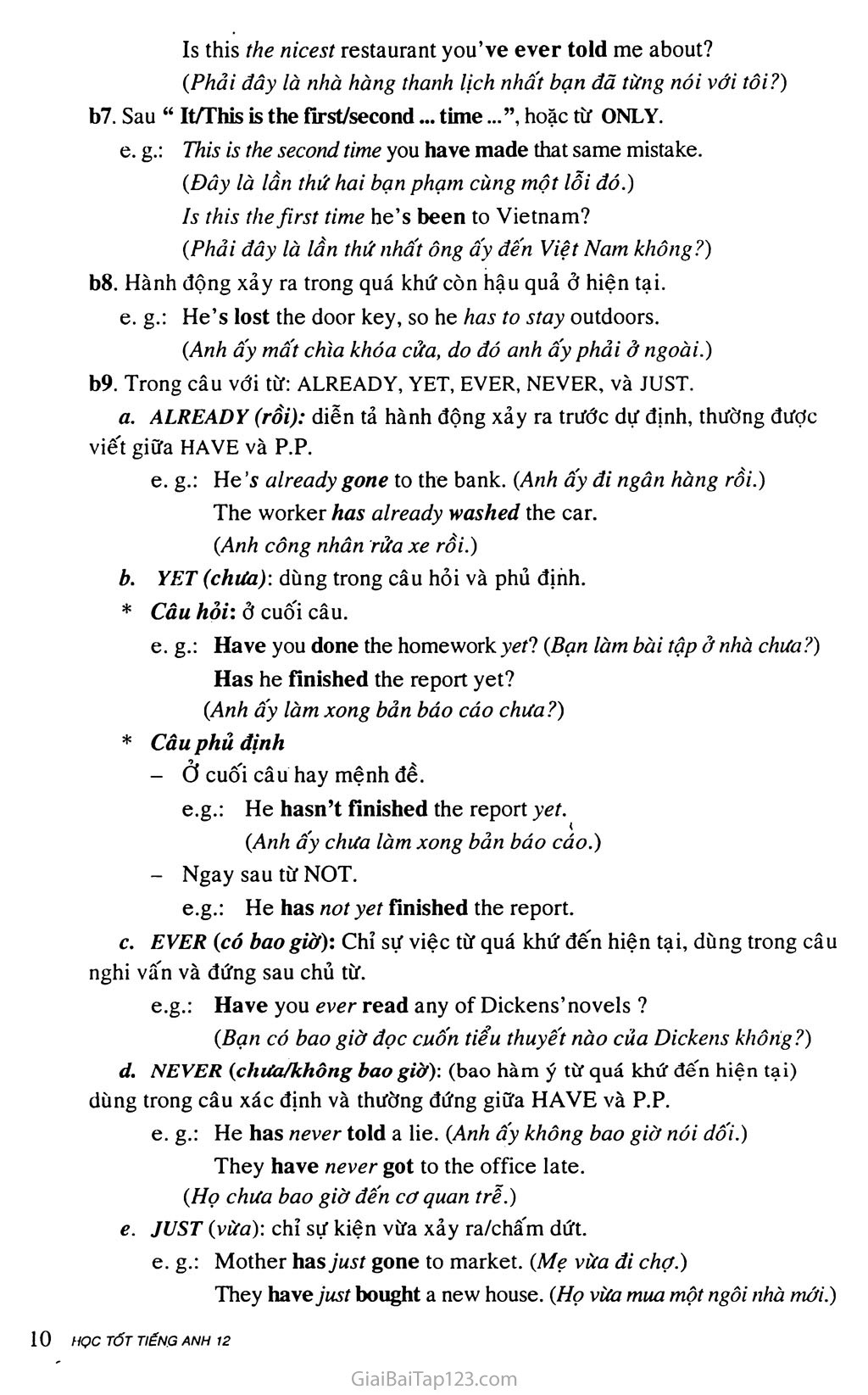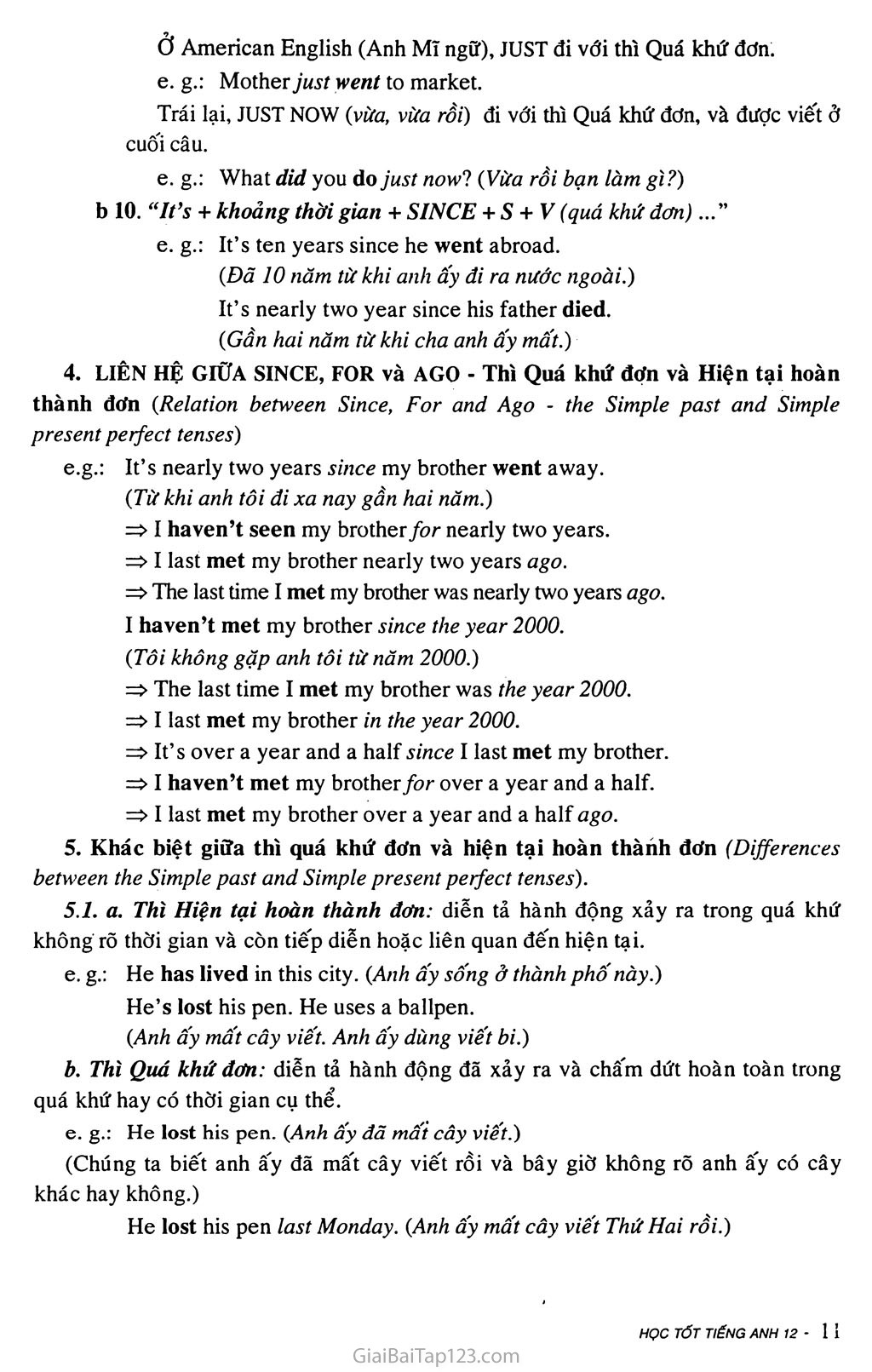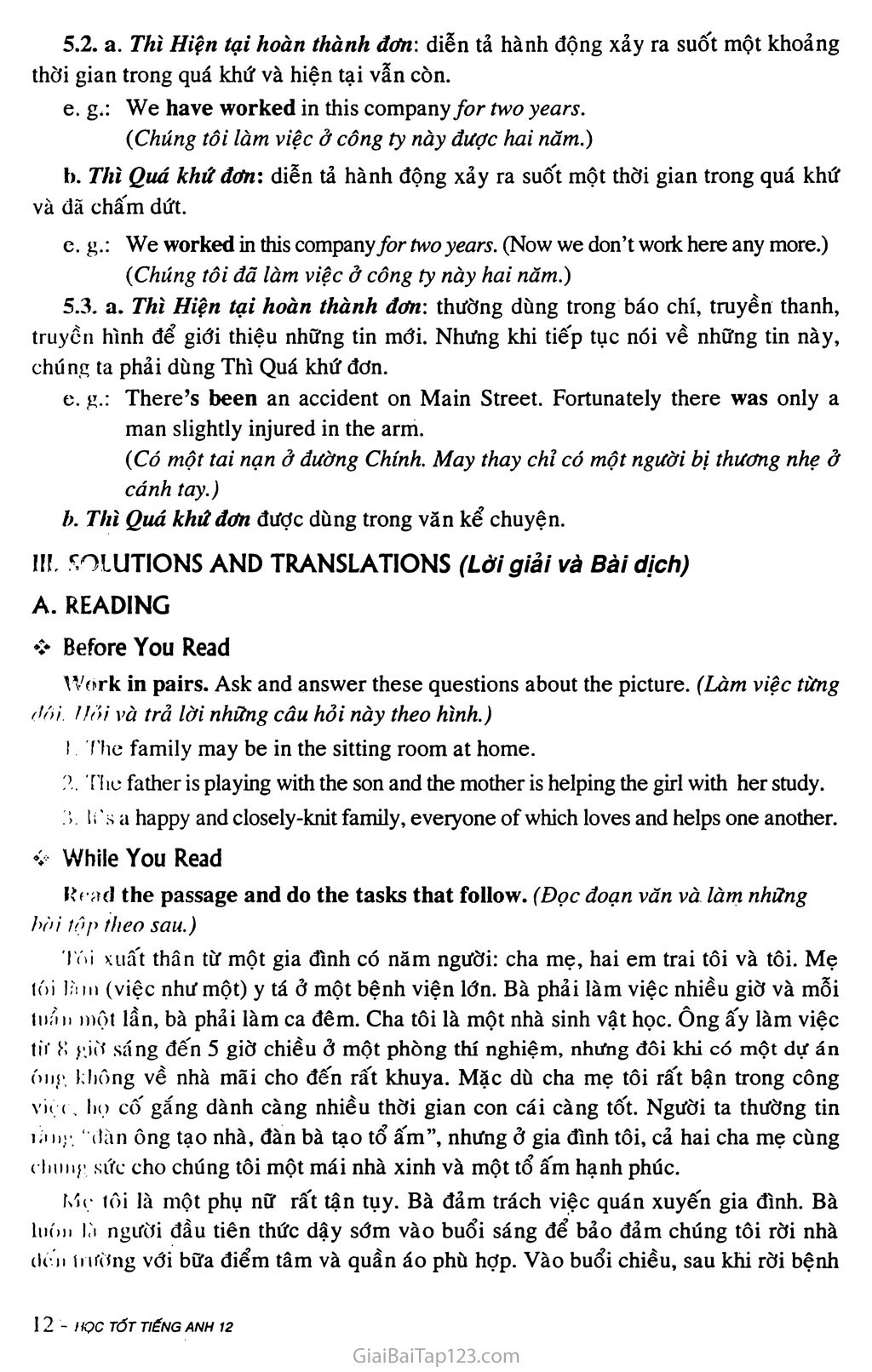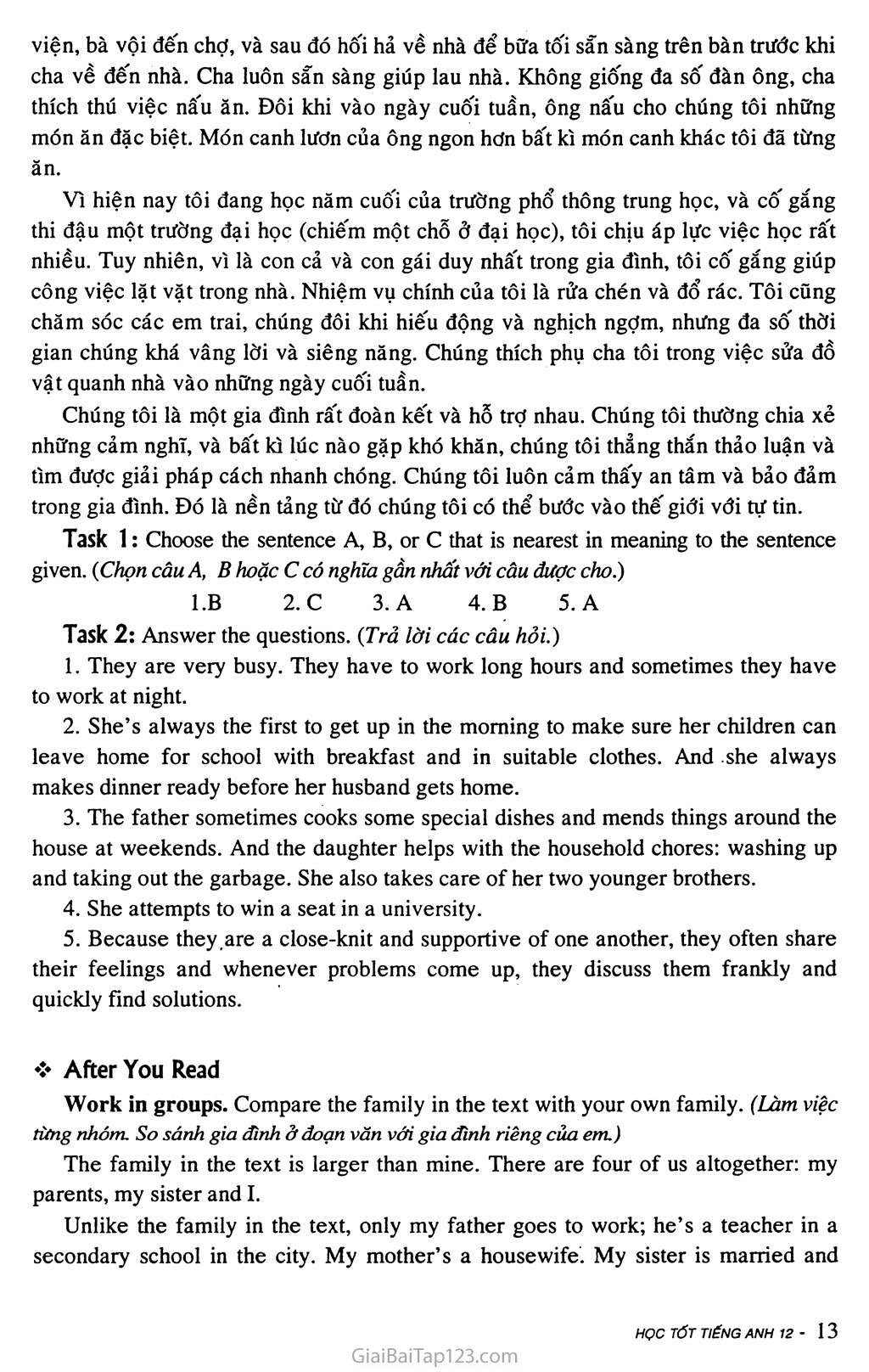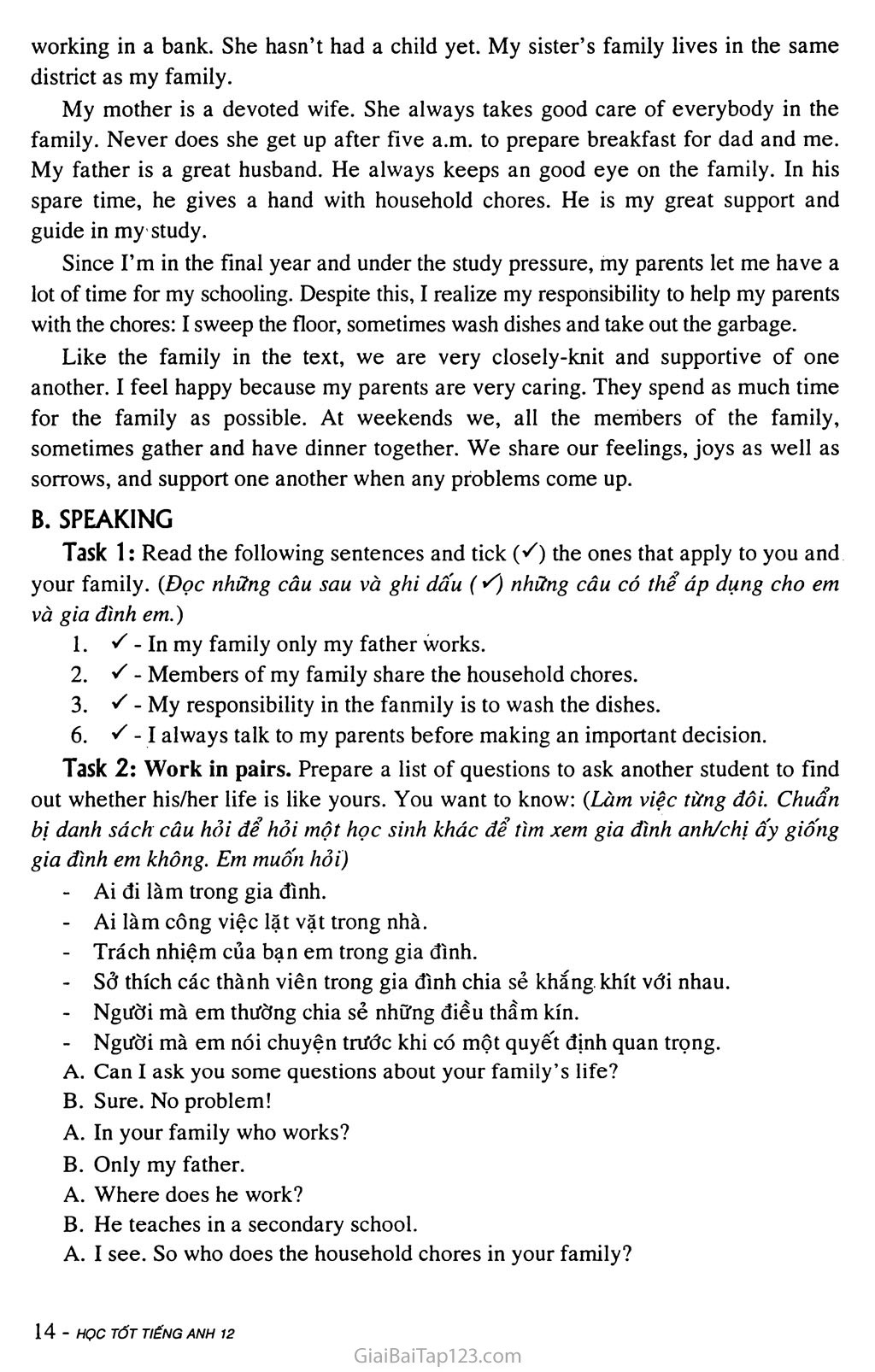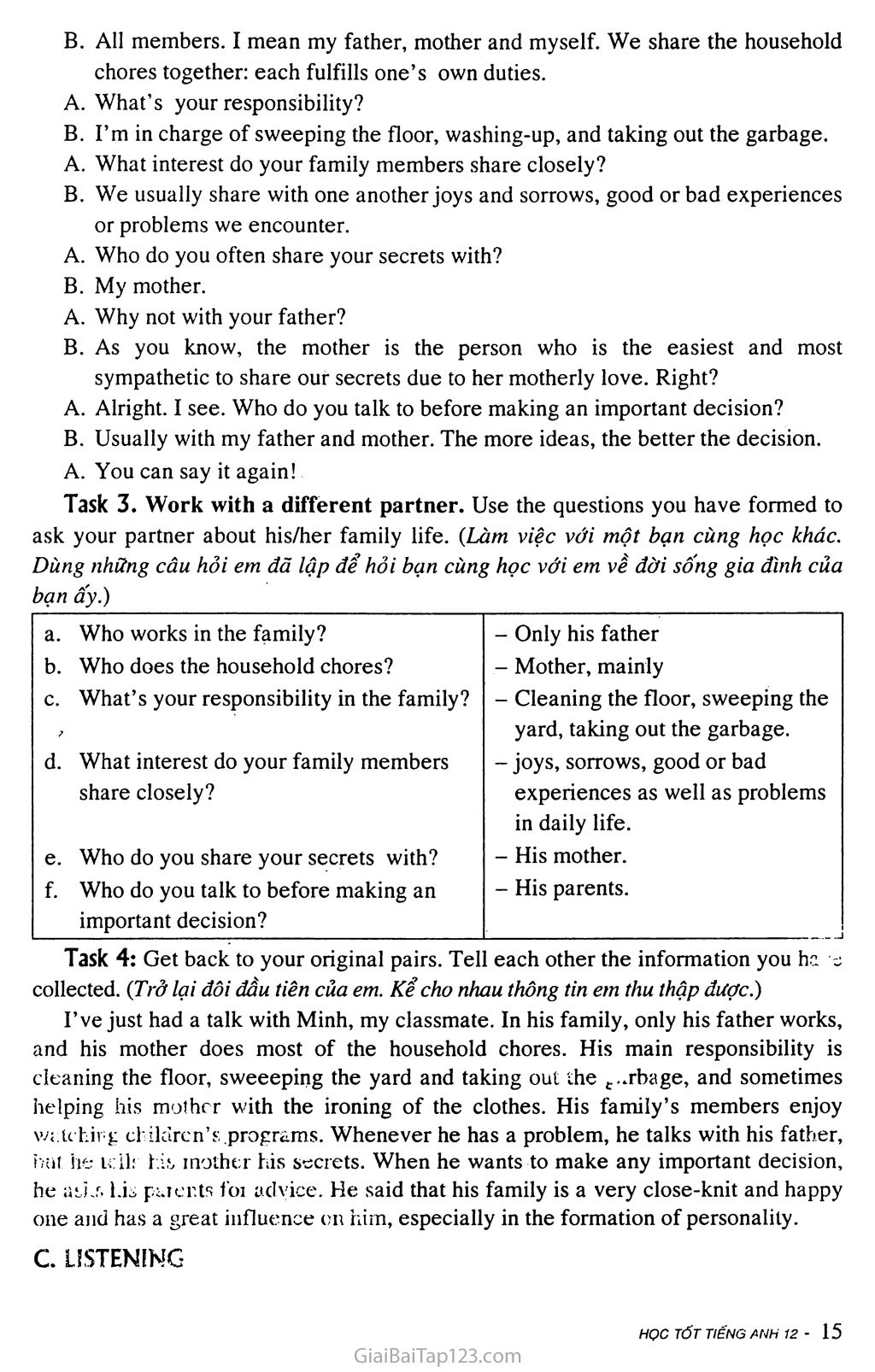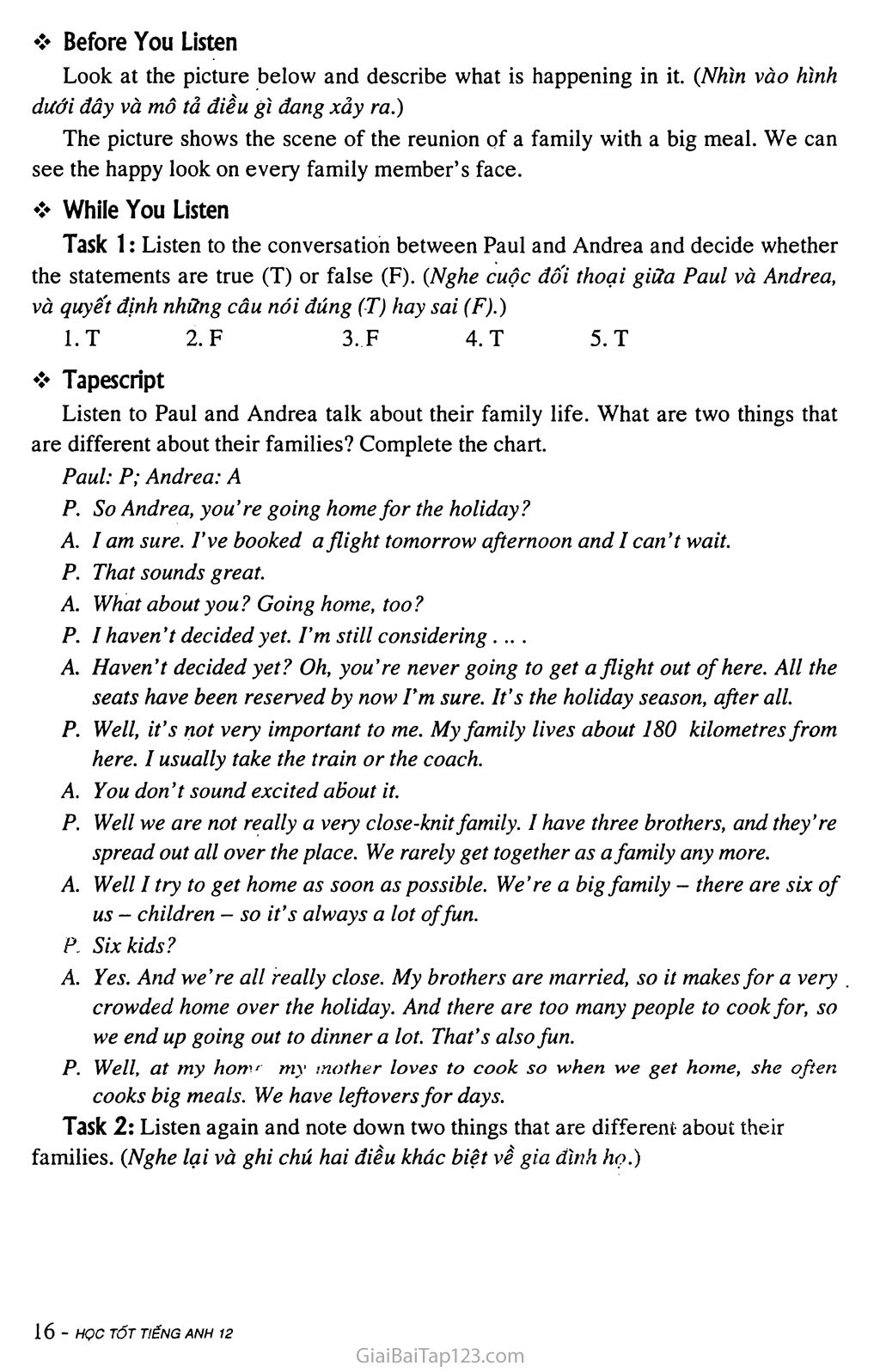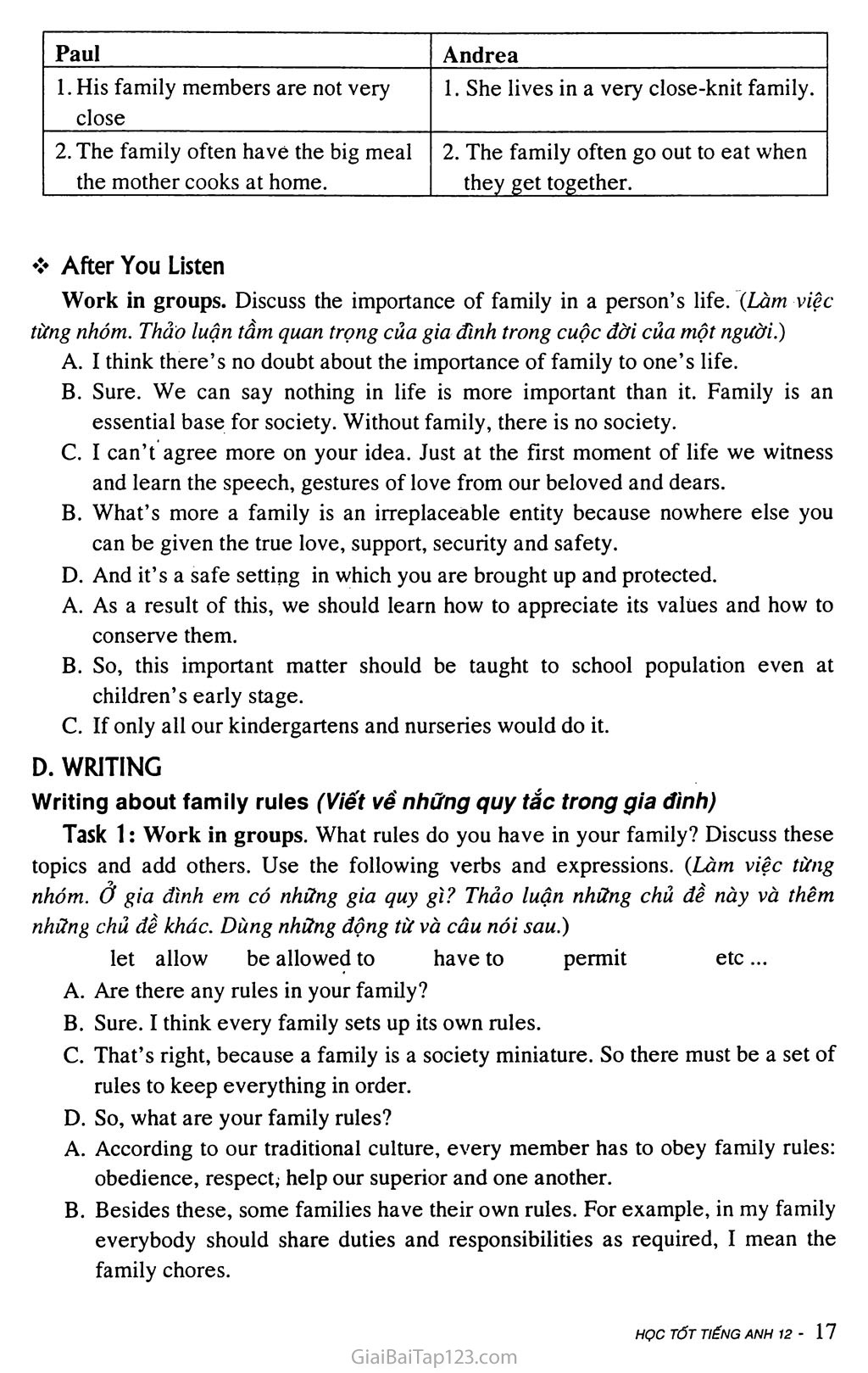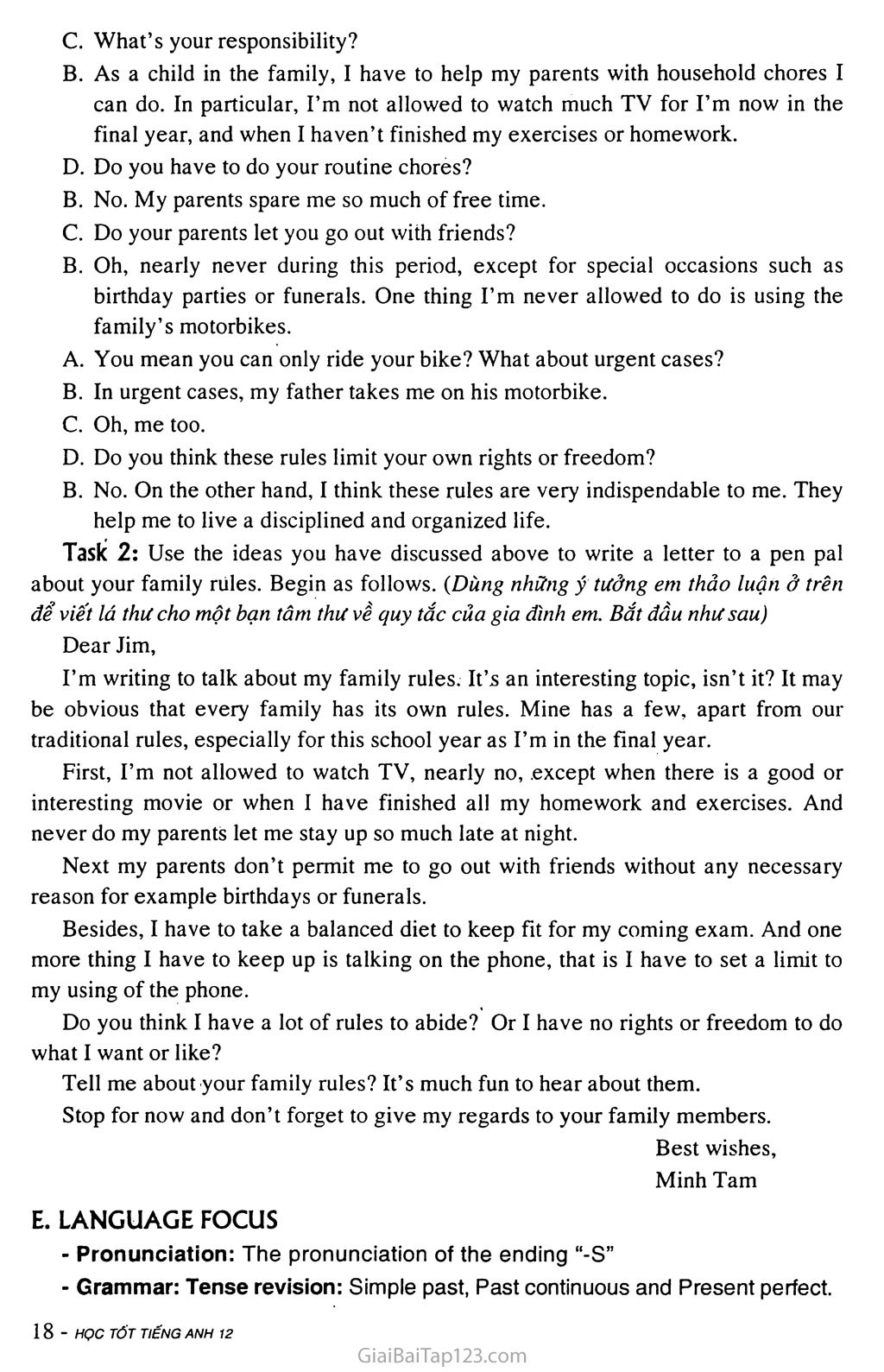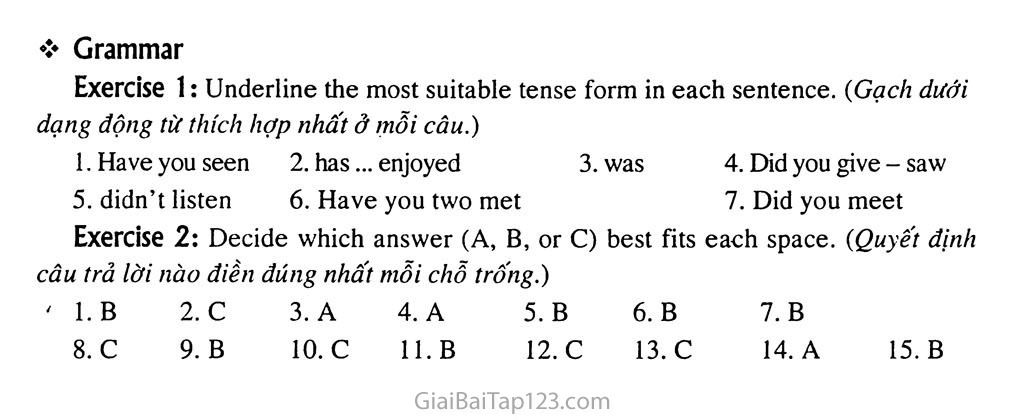Giải tiếng Anh lớp 12 Unit 1: HOME LIFE
M3
í
HOME LIFE
(Đời sống gia đình)
I. VOCABULARY
shift
Lfift]
(n)
(V)
ca (làm việc), sự thay đổi tính tình đổi chỗ, thay
shifty.
Lf.fti]
(adj)
gian xảo, lắm mưu mẹo
biologist
[bai’nl9d3rst]
(n)
nhà sinh vật học
biology
[bai’Dl9d3i]
(n)
sinh vật học
biological
[bui9’lnd3ikl]
(adj)
thuộc sinh vật học
project
[‘prod3ekt]
(n)
(V)
dự án
tính toán, lập dự án
join hands
[d39inhiendz]
(V)
work together; cùng làm việc, chung sức
take hold of one’s hand
nắm tay ai
caring
[‘keariq]
(adj)
chăm sóc, tận tụy
responsibility
[rispnnsa’bilgti]
(n)
trách nhiệm
responsible
[ri’spnnsabl]
(adj)
có/chịu trách nhiệm
takeđhe responsibility for
nhận trách nhiệm
run
run the household
[FAn]
(V)
manage, direct: điều hành, quản lí trông nom gia đình
give (someone) a hand
help someone: giúp đỡ (ai)
be willing to + V (base form)
(V)
sẵn sàng
eel
[id]
(n)
con lươn
finality
[fai’naelati]
(n)
tính chất/trạng thái cuối cùng
finalize
[‘fainalmz]
(V)
hoàn tất phầri cuối của một kế hoạch, thông qua lần cuối
attempt
[9’tempt]
(n)
(V)
sự cố gắng, thử cố gắng, thử
pressure
[‘prejg]
(n)
áp lực, sức ép
be under pressure
(V)
dưới sức ép/áp lực
pressurize
[‘prejbruiz]
(V)
gây sức ép
pressurized
[‘prejbruizd]
(adj)
pressured: cảm thấy lo lắng
chore
[tjo:].
(n)
việc vặt, công việc vặt trong nhà
take out
(V)
destroy: tiêu hủy
remove: di chuyển, cất/bỏ đi
mischievous
[‘mistfivas]
(adj)
nghịch phá, tinh nghịch
mischievousness
[‘mitfivasnis]
(n)
tính tinh nghịch
obedient
[a’bidiant]
(adj)
vâng lời
#= disobedient
[disa’bidiant]
(adj)
không vâng lời
obedience
[a’bidians]
(n)
sự vâng lời
obey
[a’bei]
(V)
vâng lời
close-knit
[‘klaosmt]
(adj)
closely-knit: đoàn kết chặt chẽ
supportive
[sa’pa.liv]
(asj)
helpful: hay giúp đỡ
come up
(V)
arise, appear: xuất hiện
frankly
[‘fraerjkli]
(adv) một cách thẳng thắn
frankness
[‘frasrjknis]
(n)
tính thẳng thắn
solution
[sa’lu:Jn]
(n)
giải pháp
solve
[snlv]
(V)
deal with: giải quyết
solvable
[‘sDlvabl]
(adj)
có thể giải quyết
secure
[si’kjoa]
(adj)
(V)
safe from harm: an toàn
bảo đảm
security
[si’kjoarati]
(n)
sự an toàn/an ninh
base
[beis]
(n)
(V)
foundation: nền tảng, cơ sở căn cứ vào
basic
[‘beisik]
(adj)
cơ bản
confidence
[‘knnfidans]
(n)
sự tin tưởng
have confidence in someone
tin tưởng (ai)
confident
[‘kunfidant]
(adj)
tin tưởng
confide
[kan’faid]
(V)
giao phó
confide in
(V)
tin cậy
separately
[‘sepratli]
(adv) một cách riêng rẽ
well-behaved
[welbi’heivd]
(adj)
có hạnh kiểm tốt
trick
[trik]
(n)
mưu mẹo, trò tinh nghịch
play trick on someone
(V)
chơi xỏ ai, lừa ai
flight
[flait]
(n)
chuyến bay
reserved
[ri’z3:vd]
(adj)
kín đáo
booked, bought in advance
được mua/đặt vé trước
reserve
[ri’z3:v]
(V)
book: mua/đặt vé/chỗ trước
coach
[kaotjl
(n)
xe buýt đường dài; huấn luyện viên
rarely
[‘real I ]
(adv)
seldom, scarcely: ít khi
leftover
[‘leftaova]
(n)
thức ăn thừa
permit
[pa’mit]
(V)
cho phép
permission
[pa’mifn]
(n)'
phép
permissive
[pa’misiv]
(adj)
cho phép, tùy ý
permissible
[pa’misabl]
(adj) allowable: dùng được, chấp nhận được
II. GRAMMAR
Pronunciation: Revision: The pronunciation of the ending “-S” (Cách phát âm chữ “-S” tận cùng)
Có ba cách phát âm chữ "-S” tận cùng .
Chữ “-S”được đọc là [-IZ] khi theo sau một trong những âm [s, tí-, d3, J, z, 3] e.g.: buses [bASiz], watches [wDtfiz], roses [raoziz],. .
Chữ “-S” được đọc là [-S ]khi theo sau một trong những âm [p, t, k, f, 0 ]. e.g.: maps [maps] , books [boks], hats [hats],. .
Chữ "-S” được đọc là [-z] khi theo những âm phụ âm còn lại hay một âm nguyên âm.
e.g.: eyes [aiz], bells [belz], plays [pleiz],...
Revision on Tenses: Simple Past, Past Progressive and Simple Present Perfect 1. SIMPLE PAST (Quá khứ đơn)-. Thì Quá khứ đơn được dùng diễn tả:
hành động xảy ra và đã chấm dứt hoàn toàn trong quá khứ. e.g.: They went to the zoo.
hành động xảy ra tại một thời điểm xác định trong quá khứ, hay có từ như: AGO, YESTERDAY, LAST, ONCE (UPON A TIME), THE OTHER DAY, FIRST.
e.g.: People built this school over 100 years ago.
(Dân chúng xây trường này cách nay hơn 100 năm.)
The other day we saw them in a supermarket.
(Một ngày nọ, chúng tôi thấy họ ở một siêu thị.)
hành động xảy ra suốt một khoảng thời gian trong quá khứ và đã chấm dứt. e.g.: They worked in a factory for 2 years. (Now they don’t work there
any more). (Họ làm việc ở một nhà máy 2 năm.)
hành động xảy ra sau một hành động khác, hay một chuỗi hành động trong quá khứ.
e.g.: Tom entered the room and stopped. He listened carefully.
(Tom vào phòng và dừng lại. Anh ấy lắng nghe cẩn thận.)
một tình huống hay thói quen trong quá khứ và nay đã châm dứt. e.g.: Every morning his father jogged before breakfast.
(Cha anh ấy từng chạy bộ trước bữa điểm tâm mỗi sáng.)
Chú ý: Cách dùng này có thể được thay bằng USED TO + V (dạng gốc).
e.g.: He used to play tennis on Saturday afternoons.
=> He played tennis on Saturday afternoons.
ở mệnh đề theo sau “It’s (about/high) time (that)..."
e.g.: It’s time they changed the method of teaching and learning.
(Đến lúc họ đổi phương pháp dạy và học.)
PAST CONTINUOUS/PROGRESSIVE (Thì Quá khứ tiếp diễn)
Form (Dạng): Thì Quá khứ tiếp diễn được cấu tạo bởi dạng quá khứ của BE và hiện tại phân từ của động từ chính (present participle of main verb: V+ING).
WAS/WERE + present participle (V+ ing)
Use (Cách dùng): Thì Quá khứ tiếp diễn được dùng diễn tả: bl. hành dộng xảy ra tại một thời điểm cụ thể trong quá khứ.
e.g.: What were you doing at 2p.m. yesterday!
(Lúc 2 giờ trưa hôm qua bạn làm gì?)
b2. một hành động đang diễn tiến bất chợt một hành động khác xảy đến ngăn chặn lại trong quá khứ. (Hành động bất chợt ở Thì đơn).
e.g.: Last night when I was doing the exercises, my friend came in.) (Đêm qua khi tôi làm bài tập, bạn tôi bước vào.)
b3. hai hoặc nhiều hành động xảy ra cùng một lúc trong quá khứ.
e.g.: Last weekend, when I was working in the garden, Tom was
playing ball with friends at school.
(Ngày cuối tuần vừa qua, khi tôi làm việc trong vườn, Tom chơi banh với các bạn ở trường.)
b4. sự kiện dự định trong quá khứ.
e.g.: David was taking a course in French, but he had to cancel.
(David dự định học một khóa tiếng Pháp, nhưng anh ấy phải hủy bỏ.) b5. dùng với từ “ALWAYS” diễn tả hành động lặp đi lặp lại thường xuyên và
bao hàm ý không hài lòng trong quá khứ.
e.g.: He was always coming to work late. (Anh ấy luôn đi đến chỗ làm trễ.)
SIMPLE PRESENT PERFECT (Thì Hiện tại hoàn thành đơn)
Form (Dạng): Thì Hiện hoàn thành đơn được câu tạo bởi dạng hiện tại của HAVE và quá khứ phân từ (past participle) của động từ chính.
HAVE/HAS + past participle (P.P.)
Have được đọc là [ [h}av]; Has [ {h}az]
Use (Cách dùng)-. Thì Hiện tại hoàn thành đơn diễn tả bl. hành động xảy ra trong quá khứ không rõ thời gian.
e.g.: He has met this man. (Anh ấy đã gặp người đàn ông này.) b2. hành động xảy ra suôi một khoảng thời trong quá khứ và còn tiếp tục đến
hiện tại.
e.g.: They’ve lived in this part for two years.
(Họ sống nơi này được hai năm.)
Hoặc hành động vừa chấm dứt.
e.g.: I haven’t seen you for ages. (Tôi không gặp bạn mấy năm rồi.)
“FOR + khoảng thời gian” (FOR + a period of time): thường được dùng cho trường hợp này.
“FOR + a period of time + NOW ” hoặc “FOR + the last/past + a period of time ” được dùng với Thì Hiện tại hoàn thành tiếp diễn: “have/has + been + V-ing
e.g.: We’ve been studying English/or a year now.
(Chúng tôi học tiếng Anh được một năm rọi.)
They have been working here/or the last two years.
(Hai năm qua họ làm việc ở đây.)
b3. Hành động bắt đầu ở một thời điểm cụ thể trong quá khứ và còn tiếp diễn đến hiện tại, thường trong câu có từ “SINCE + thời điểm/một nhật kỉ ” (a point of time or a date).
e. g.: He’s worked in this office since last January.
(Anh ấy làm ở văn phòng này từ Tháng Giêng rồi.)
He’s written for this newspaper since 1998.
(Anh ấy viết cho tờ báo này từ 1998.)
Thì Hiện tại hoàn thành tiếp diễn thường được dùng ở trường hợp (2) và (3) để nhân mạnh tính liên tục.
e. g.: We’ve been studying English for two years now.
(Chúng tôi học tiếng Anh hai năm nay.)
We’ve been living in this house since the autumn of 1990.
(Chúng tôi sống ở nhà này từ mùa thu năm 1990.)
* Sau SINCE có thể là một mệnh đề, thường ở Thì Quá khứ đơn. e.g.: Since he left school, he has worked in this office.
(Từ khi rời khỏi trường, anh ấy làm việc ở văn phòng này.) b4. Hành động lặp đi lặp trong quá khứ không rõ thời gian.
e.g.: He’s been to that place many times. (Anh ấy đã đến nơi đó nhiều lần.) We’ve seen this film twice. (Chúng tôi xem phim này hai lần rồi.)
Chú ý: Thường có cụm từ chỉ số lần: many/several/four times,...twice, etc. b5. Trong câu có từ: recently, lately (mới đây, vừa rồi), so far (cho tới bây
giờ), till/until now, up to now, up to the present (cho tới bây giờ), before (truOi đây), all his/her/my ... life (suốt đời anh ấy/chị ấy/tôỉ...).
e.g.: He has finished about half the work so far.
(Cho tới bây giờ anh ấy làm xong khoảng nửa công việc.)
They have bought some new books for the library lately!recently.
• (Vừa rồi họ mua một số sách mới cho thư viện.)
b6. Sau so sánh tuyệt đối (a clause in the superlative); từ EVER được dùng vơi
Thì Hiện tại hoàn thành.
e.g.: This is the most interesting book I’ve ever read.
(Đây là cuo'n sách hay nhất tôi đã từng đọc.)
Is this the nicest restaurant you’ve ever told me about?
(Phải đây là nhà hàng thanh lịch nhất bạn đã từng nói với tôi?)
b7. Sau “ It/This is the flrst/second... time...”, hoặc từ ONLY, e. g.: This is the second time you have made that same mistake.
(Đày là lần thứ hai bạn phạm cùng một lỗi đó.)
Is this the first time he’s been to Vietnam?
(Phải đây là lần thứ nhất ông ấy đến Việt Nam không?)
b8. Hành động xảy ra trong quá khứ còn hậu quả ở hiện tại. e. g.: He’s lost the door key, so he has to stay outdoors.
(Anh ấy mất chìa khóa cửa, do đó anh ấy phải ở ngoài.) b9. Trong câu với từ: ALREADY, YET, EVER, NEVER, và JUST.
ALREADY (rồi): diễn tả hành động xảy ra trước dự định, thường được viết giữa HAVE và p.p.
e. g.: He 's already gone to the bank. (Anh ấy đi ngân hàng rồi.)
The worker has already washed the car.
(Anh công nhân rửa xe rồi.)
YET (chưa)-, dùng trong câu hỏi và phủ định.
Câu hỏi: ở cuối câu.
e. g.: Have you done the homework yeti (Bạn làm bài tập ở nhà chưa?) Has he finished the report yet?
(Anh ấy làm xong bản báo cáo chưa?)
Câu phủ định
Ớ cuối câu hay mệnh đề.
e.g.: He hasn’t finished the report yet.
(Anh ay chưa làm xong bản báo cáo.)
Ngay sau từ NOT.
e.g.: He has not yet finished the report.
EVER (có bao giờ): Chỉ sự việc từ quá khứ đến hiện tại, dùng trong câu nghi vân và đứng sau chủ từ.
e.g.: Have you ever read any of Dickens’novels ?
(Bạn có bao giờ đọc cuốn tiểu thuyết nào của Dickens không?)
NEVER (chưa/không bao giờ)-, (bao hàm ý từ quá khứ đến hiện tại) dùng trong câu xác định và thường đứng giữa HAVE và p.p.
g.: He has never told a lie. (Anh ấy không bao giờ nói dối.)
They have never got to the office late.
(Họ chưa bao giờ đến cơ quan trễ.)
JUST (vừa): chỉ sự kiện vừa xảy ra/châm dứt.
e. g.: Mother has just gone to market. (Mẹ vừa đi chợ.)
They have just bought a new house. (Họ vừa mua một ngôi nhà mới.)
ở American English (Anh Mĩ ngữ), JUST đi với thì Quá khứ đơn. e. g.: Mother just went to market.
Trái lại, JUST NOW (vừa, vừa rồi) đi với thì Quá khứ đơn, và được viết ở cuối câu.
e. g.: What did you do just now! (Vừa rồi bạn làm gì?) b 10. “It’s + khoảng thời gian + SINCE + s + v (quá khứ đơn)...”
e. g.: It’s ten years since he went abroad.
(Đã 10 năm từ khi anh ấy đi ra nước ngoài.)
It’s nearly two year since his father died.
(Gần hai năm từ khi cha anh ấy mất.)
LIÊN HỆ GIỮA SINCE, FOR và AGO - Thì Quá khứ đơn và Hiện tại hoàn thành đơn (Relation between Since, For and Ago - the Simple past and Simple present perfect tenses)
e.g.: It’s nearly two years since my brother went away.
(Từ khi anh tôi đi xa nay gần hai năm.)
=> I haven’t seen my brother for nearly two years.
=> I last met my brother nearly two years ago.
=> The last time I met my brother was nearly two years ago.
I haven’t met my brother since the year 2000.
(Tôi không gặp anh tôi từ năm 2000.)
=> The last time I met my brother was the year 2000.
=> I last met my brother in the year 2000.
It’s over a year and a half since I last met my brother.
=> I haven’t met my brother/ơr over a year and a half.
=> I last met my brother over a year and a half ago.
Khác biệt giữa thì quá khứ đơn và hiện tại hoàn thành đơn (Differences between the Simple past and Simple present perfect tenses).
5.1. a. Thì Hiện tại hoàn thành đơn: diễn tả hành động xảy ra trong quá khứ không rõ thời gian và còn tiếp diễn hoặc liên quan đến hiện tại.
e. g.: He has lived in this city. (Anh ấy sống ở thành phô'này.)
He’s lost his pen. He uses a ballpen.
(Anh ấy mất cây viết. Anh ấy dùng viết bi.)
Thì Quá khứ đơn: diễn tả hành động đã xảy ra và châm dứt hoàn toàn trong quá khứ hay có thời gian cụ thể.
e. g.: He lost his pen. (Anh ấy đã mâi cây viết.)
(Chúng ta biết anh ắy đã mát cây viết rồi và bây giờ không rõ anh ây có cây khác hay không.)
He lost his pen last Monday. (Anh ấy mất cây viết Thứ Hai rồi.)
a. Thì Hiện tại hoàn thành ăơn\ diễn tả hành động xảy ra suốt một khoảng thời gian trong quá khứ và hiện tại vẫn còn.
e. g.: We have worked in this company for two years.
(Chúng tôi làm việc ở công ty này được hai năm.)
b. Thì Quá khứ đơn: diễn tả hành động xảy ra suốt một thời gian trong quá khứ và đã châm dứt.
e. g.: We worked in this company for two years. (Now we don’t work here any more.) (Chúng tôi đã làm việc ở công ty này hai năm.)
a. Thì Hiện tại hoàn thành đơn: thường dùng trong báo chí, truyền thanh, truyền hình để giới thiệu những tin mới. Nhưng khi tiếp tục nói về những tin này, chúng ta phải dùng Thì Quá khứ đơn.
e. g.: There’s been an accident on Main Street. Fortunately there was only a man slightly injured in the arm.
(Có một tai nạn ỗ đường Chính. May thay chỉ có một người bị thương nhẹ ở cánh tay.)
b. Thì Quá khứ đơn được dùng trong văn kể chuyện.
HL SOLUTIONS AND TRANSLATIONS (Lời giải và Bài dịch)
A. READING
Before You Read
Work in pairs. Ask and answer these questions about the picture. (Làm việc từng đôi. Hỏi và trả lời những câu hỏi này theo hình.)
I The family may be in the sitting room at home.
The father is playing with the son and the mother is helping the gừl with her study. Il’s a happy and closely-knit family, everyone of which loves and helps one another.
While You Read
Read the passage and do the tasks that follow. (Đọc đoạn văn và làm những hài tập theo sau.)
Toi xuất thân từ một gia đình có năm người: cha mẹ, hai em trai tôi và tôi. Mẹ lói là III (việc như một) y tá ở một bệnh viện lớn. Bà phải làm việc nhiều giờ và mỗi twill một lần, bà phải làm ca đêm. Cha tôi là một nhà sinh vật học. Ông ây làm việc tơ 8 giờ sáng đến 5 giờ chiều ở một phòng thí nghiệm, nhưng đôi khi có một dự án ông kliông về nhà mãi cho đến rất khuya. Mặc dù cha mẹ tôi rất bận trong công vii. (., họ cố gắng dành càng nhiều thời gian con cái càng tốt. Người ta thường tin 13 ng. 'dàn ông tạo nhà, đàn bà tạo tổ ấm”, nhưng ở gia đình tôi, cả hai cha mẹ cùng chung sức cho chúng tôi một mái nhà xinh và một tổ ấm hạnh phúc.
Mẹ tôi là một phụ nữ rất tận tụy. Bà đảm trách việc quán xuyến gia đình. Bà luôn 1,1 ngươi đầu tiên thức dậy sớm vào buổi sáng để bảo đảm chúng tôi rời nhà tlén trương với bữa điểm tâm và quần áo phù hợp. Vào buổi chiều, sau khi rời bệnh viện, bà vội đến chợ, và sau đó hối hả về nhà để bữa tối sẵn sàng trên bàn trước khi cha về đến nhà. Cha luôn sấn sàng giúp lau nhà. Không giống đa số đàn ông, cha thích thú việc nấu ăn. Đôi khi vào ngày cuối tuần, ông nấu cho chúng tôi những món ăn đặc biệt. Món canh lươn của ông ngon hơn bất kì món canh khác tôi đã từng ăn.
Vì hiện nay tôi đang học năm cuối của trường phổ thông trung học, và cố’ gắng thi đậu một trường đại học (chiếm một chỗ ở đại học), tôi chịu áp lực việc học rất nhiều. Tuy nhiên, vì là con cả và con gái duy nhát trong gia đình, tôi cố gắng giúp công việc lặt vặt trong nhà. Nhiệm vụ chính của tôi là rửa chén và đổ rác. Tôi cũng chăm sóc các em trai, chúng đôi khi hiếu động và nghịch ngợm, nhưng đa số’ thời gian chúng khá vâng lời và siêng năng. Chúng thích phụ cha tôi trong việc sửa đồ vật quanh nhà vào những ngày cuối tuần.
Chúng tôi là một gia đình rất đoàn kết và hỗ trợ nhau. Chúng tôi thường chia xẻ những cảm nghĩ, và bất kì lúc nào gặp khó khăn, chúng tôi thẳng thắn thảo luận và tìm được giải pháp cách nhanh chóng. Chúng tôi luôn cảm thấy an tâm và bảo đảm trong gia đình. Đó là nền tảng từ đó chúng tôi có thể bước vào thế giới với tự tin.
Task 1: Choose die sentence A, B, or c that is nearest in meaning to the sentence given. {Chọn câu A, B hoặc c có nghĩa gần nhất với câu được cho.)
B 2. c 3. A 4. B 5. A
Task 2: Answer the questions. {Trả lời các câu hỏi.)
They are very busy. They have to work long hours and sometimes they have to work at night.
She’s always the first to get up in the morning to make sure her children can leave home for school with breakfast and in suitable clothes. And she always makes dinner ready before her husband gets home.
The father sometimes cooks some special dishes and mends things around the house at weekends. And the daughter helps with the household chores: washing up and taking out the garbage. She also takes care of her two younger brothers.
She attempts to win a seat in a university.
Because they, are a close-knit and supportive of one another, they often share their feelings and whenever problems come up, they discuss them frankly and quickly find solutions.
❖ After You Read
Work in groups. Compare the family in the text with your own family. (Làm việc từng nhóm. So sánh gia đình ở đoạn văn với gia đình riêng của em.)
The family in the text is larger than mine. There are four of US altogether: my parents, my sister and I.
Unlike the family in the text, only my father goes to work; he’s a teacher in a secondary school in the city. My mother’s a housewife. My sister is married and working in a bank. She hasn’t had a child yet. My sister’s family lives in the same district as my family.
My mother is a devoted wife. She always takes good care of everybody in the family. Never does she get up after five a.m. to prepare breakfast for dad and me. My father is a great husband. He always keeps an good eye on the family. In his spare time, he gives a hand with household chores. He is my great support and guide in my study.
Since I’m in the final year and under the study pressure, my parents let me have a lot of time for my schooling. Despite this, I realize my responsibility to help my parents with the chores: I sweep the floor, sometimes wash dishes and take out the garbage.
Like the family in the text, we are very closely-knit and supportive of one another. I feel happy because my parents are very caring. They spend as much time for the family as possible. At weekends we, all the members of the family, sometimes gather and have dinner together. We share our feelings, joys as well as sorrows, and support one another when any problems come up.
B. SPEAKING
Task 1 : Read the following sentences and tick (*0 the ones that apply to you and your family. {Đọc những câu sau và ghi dấu (S) những câu có thể áp dụng cho em và gia đình em.)
'C - In my family only my father works.
- Members of my family share the household chores.
s - My responsibility in the fanmily is to wash the dishes.
-1 always talk to my parents before making an important decision.
Task 2: Work in pairs. Prepare a list of questions to ask another student to find out whether his/her life is like yours. You want to know: {Làm việc từng đôi. Chuẩn bị danh sách câu hỏi để hỏi một học sinh khác để tìm xem gia đình anh/chị ấy giông gia đình em không. Em muốn hỏi)
Ai đi làm trong gia đình.
Ai làm công việc lặt vặt trong nhà.
Trách nhiệm của bạn em trong gia đình.
Sở thích các thành viên trong gia đình chia sẻ khắng khít với nhau.
Người mà em thường chia sẻ những điều thầm kín.
Người mà em nói chuyện trước khi có một quyết định quan trọng.
Can I ask you some questions about your family’s life?
Sure. No problem!
In your family who works?
Only my father.
Where does he work?
He teaches in a secondary school.
A. I see. So who does the household chores in your family?
B. All members. I mean my father, mother and myself. We share the household chores together: each fulfills one’s own duties.
What’s your responsibility?
I’m in charge of sweeping the floor, washing-up, and taking out the garbage.
What interest do your family members share closely?
We usually share with one another joys and sorrows, good or bad experiences or problems we encounter.
Who do you often share your secrets with?
My mother.
Why not with your father?
As you know, the mother is the person who is the easiest and most sympathetic to share our secrets due to her motherly love. Right?
Alright. I see. Who do you talk to before making an important decision?
Usually with my father and mother. The more ideas, the better the decision.
A. You can say it again!
Task 3. Work with a different partner. Use the questions you have formed to ask your partner about his/her family life. (Làm việc với một bạn cùng học khác. Dùng những câu hỏi em đã lập để hỏi bạn cùng học với em về đời sống gia đình của bạn ấy.)
Only his father
Mother, mainly
Cleaning the floor, sweeping the yard, taking out the garbage.
joys, sorrows, good or bad experiences as well as problems in daily life.
His mother.
His parents.
Who works in the family?
Who does the household chores?
What’s your responsibility in the family?
What interest do your family members share closely?
Who do you share your secrets with?
Who do you talk to before making an important decision?
Task 4: Get back to your original pairs. Tell each other the information you ha e collected. (Trở lại đôi đầu tiên của em. Kể cho nhau thông tin em thu thập được.)
I’ve just had a talk with Minh, my classmate. In his family, only his father works, and his mother does most of the household chores. His main responsibility is cleaning the floor, sweeeping the yard and taking out the e..rbage, and sometimes helping his mother with the ironing of the clothes. His family’s members enjoy watching children’s.programs. Whenever he has a problem, he talks with his father, nut he I..Hr his mother his secrets. When he wants to make any important decision, he asks his parents for advice. He said that his family is a very close-knit and happy one and has a great influence on him, especially in the formation of personality, c. LISTENING
Before You Listen
Look at the picture below and describe what is happening in it. (Nhìn vào hình dưới đây và mô tả điều gì đang xảy ra.)
The picture shows the scene of the reunion of a family with a big meal. We can see the happy look on every family member’s face.
While You Listen
Task 1 : Listen to the conversation between Paul and Andrea and decide whether the statements are true (T) or false (F). (Nghe cuộc đối thoại giữa Paul và Andrea, và quyết định những câu nói đúng (T) hay sai (F).)
l.T 2. F 3. F 4. T 5. T
Tapescript
Listen to Paul and Andrea talk about their family life. What are two things that are different about their families? Complete the chart.
Paul: P; Andrea: A
p. So Andrea, you’re going home for the holiday?
A. I am sure. I’ve booked a flight tomorrow afternoon and I can’t wait, p. That sounds great.
A. What about you? Going home, too?
p. I haven’t decided yet. I'm still considering . .. .
A. Haven’t decided yet? Oh, you’re never going to get a flight out of here. All the seats have been reserved by now I’m sure. It’s the holiday season, after all.
p. Well, it’s not very important to me. My family lives about 180 kilometres from here. I usually take the train or the coach.
A. You don’t sound excited about it.
p. Well we are not really a very close-knit family. I have three brothers, and they’re spread out all over the place. We rarely get together as a family any more.
A. Well I try to get home as soon as possible. We’re a big family - there are six of us - children - so it’s always a lot of fun.
p. Six kids?
A. Yes. And we’re all really close. My brothers are married, so it makes for a very . crowded home over the holiday. And there are too many people to cook for, so we end up going out to dinner a lot. That’s also fun.
p. Well, at my homr my mother loves to cook so when we get home, she often cooks big meals. We have leftovers for days.
Task 2: Listen again and note down two things that are different about their families. (Nghe lại và ghi chú hai điều khác biệt về gia đình họ.)
Paul
Andrea
1. His family members are not very close
1. She lives in a very close-knit family.
2. The family often have the big meal the mother cooks at home.
2. The family often go out to eat when they get together.
❖ After You Listen
Work in groups. Discuss the importance of family in a person’s life. {Làm việc từng nhóm. Thảo luận tầm quan trọng của gia đình trong cuộc đời của một người.')
I think there’s no doubt about the importance of family to one’s life.
Sure. We can say nothing in life is more important than it. Family is an essential base for society. Without family, there is no society.
I can’t agree more on your idea. Just at the first moment of life we witness and learn the speech, gestures of love from our beloved and dears.
B. What’s more a family is an irreplaceable entity because nowhere else you can be given the true love, support, security and safety.
D. And it’s a safe setting in which you are brought up and protected.
As a result of this, we should learn how to appreciate its values and how to conserve them.
So, this important matter should be taught to school population even at children’s early stage.
c. If only all our kindergartens and nurseries would do it.
D. WRITING
Writing about family rules (Viết về những quy tắc trong gia đình)
Task 1: Work in groups. What rules do you have in your family? Discuss these topics and add others. Use the following verbs and expressions. (Làm việc từng
nhóm. Ớ gia đình em có những gia quy gì? Thảo luận những chủ đề này và thêm
những chủ đề khác. Dùng những động từ và câu nói sau.)
let allow be allowed to have to permit etc...
Are there any rules in your family?
Sure. I think every family sets up its own rules.
c. That’s right, because a family is a society miniature. So there must be a set of rules to keep everything in order.
D. So, what are your family rules?
According to our traditional culture, every member has to obey family rules: obedience, respect; help our superior and one another.
Besides these, some families have their own rules. For example, in my family everybody should share duties and responsibilities as required, I mean the family chores.
c. What’s your responsibility?
B. As a child in the family, I have to help my parents with household chores I can do. In particular, I’m not allowed to watch much TV for I’m now in the final year, and when I haven’t finished my exercises or homework.
D. Do you have to do your routine chores?
B. No. My parents spare me so much of free time, c. Do your parents let you go out with friends?
B. Oh, nearly never during this period, except for special occasions such as birthday parties or funerals. One thing I’m never allowed to do is using the family’s motorbikes.
You mean you can only ride your bike? What about urgent cases?
In urgent cases, my father takes me on his motorbike, c. Oh, me too.
D. Do you think these rules limit your own rights or freedom?
B. No. On the other hand, I think these rules are very indispendable to me. They
help me to live a disciplined and organized life.
Task 2: Use the ideas you have discussed above to write a letter to a pen pal about your family rules. Begin as follows. (Dùng những ý tưởng em thảo luận ở trên để viết lá thư cho một bạn tâm thư về quy tắc của gia đình em. Bắt đầu như sau)
Dear Jim,
I’m writing to talk about my family rules. It’s an interesting topic, isn’t it? It may be obvious that every family has its own rules. Mine has a few, apart from our traditional rules, especially for this school year as I’m in the final year.
First, I’m not allowed to watch TV, nearly no, .except when there is a good or interesting movie or when I have finished all my homework and exercises. And never do my parents let me stay up so much late at night.
Next my parents don’t permit me to go out with friends without any necessary reason for example birthdays or funerals.
Besides, I have to take a balanced diet to keep fit for my coming exam. And one more thing I have to keep up is talking on the phone, that is I have to set a limit to my using of the phone.
Do you think I have a lot of rules to abide? Or I have no rights or freedom to do what I want or like?
Tell me about your family rules? It’s much fun to hear about them.
Stop for now and don’t forget to give my regards to your family members.
Best wishes,
Minh Tam
E. LANGUAGE FOCUS
Pronunciation: The pronunciation of the ending “-S”
Grammar: Tense revision: Simple past, Past continuous and Present perfect.
❖ Grammar
Exercise 1: Underline the most suitable tense form in each sentence. (Gạch dưới dạng động từ thích hợp nhất ở mỗi câu.)
Have you seen 2. has... enjoyed 3. was 4. Did you give - saw
5. didn’t listen 6. Have you two met 7. Did you meet
Exercise 2: Decide which answer (A, B, or C) best fits each space. (Quyết định
câu trả lời nào điền đúng nhất mỗi chỗ trống.)
' l.B 2. c 3. A 4. A 5 B 6. B 7. B
8. c 9. B 10. c 11. B 12. c 13. c 14. A 15. B

